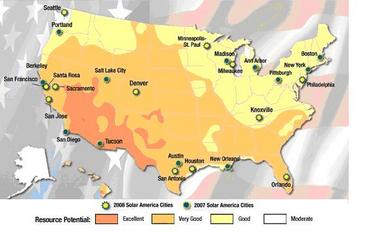From the Senator's Desk . . .
September 17, 2009
Minus twenty sounds like the temperature in the Arctic. So what does minus twenty have to do with the sun here in Texas? Here’s the story.
Written by Senator Eliot Shapleigh, www.shapleigh.org

MINUS TWENTY
Minus twenty sounds like the temperature in the Arctic. So what does minus twenty have to do with the sun here in Texas? Here’s the story.
Minus twenty is what your energy bill can be in Houston, Texas if you own a solar home. Specifically, homes that have been built using floor plans and standards that increase its energy efficiency and have solar panels installed on the rooftop can produce more energy than what the homes use. The idea of installing solar panels on the rooftops of energy efficient affordable homes in Houston was first pitched to the City of Houston by Burghli Homes builder, Zach Burghli. Thus far, Burghli homes has built ten of these homes. In June 2009, the second hottest month in recorded Houston history, the electric bill on one of these homes was ‘minus twenty.’ That is, the owner of the home actually got money back as a credit for his electricity! How’s that for innovation?
Houston is also working to keep hope alive by providing more affordable housing while doing the right thing and encouraging clean energy. The Houston Hope program, spearheaded by Houston's Mayor Bill White, makes energy efficient affordable homes available to low to moderate-income families. The city purchases tax delinquent lots in selected areas near downtown, then sells them to approved builders within the program. The builders must build the homes to the Energy Star standard. Additionally, families may qualify for up to $37,500 in down payment assistance, and even more (up to $39,900) for police officers, fire fighters, and teachers. And what about the electric bill?
Under a deal with TXU energy company, residents can sell excess electricity from their solar roofs to TXU. The price that TXU pays is 7.5 cents per KWH. That energy then goes back into the grid for use across the City of Houston.
Here’s a map of solar potential across Texas. As you can see, west Texas, and especially God’s country, is perfectly situated to be the “America’s Sun City."
Click here to view larger image.
The U.S. Department of Energy selected the 25 cities on the map through a competitive process and designated them as the cities to lay the foundation for a solar energy market. To learn more about the evaluation criteria please click here.
Houston's solar project promises to bring solar programs to affordable housing areas. Already, the Houston City Council has approved building ten "near zero energy" homes in the Houston Hope neighborhoods that would include a two-kilowatt rooftop solar panel.
A "near zero energy" house is one that produces enough, or more than enough, renewable energy on site to meet all the power needs of the house on an annual basis. Currently, the on-site energy source of choice is a rooftop photovoltaic (PV) and solar water heating systems. A small, grid-tied PV system cannot constantly supply all the electricity needed in the house—it will still need to use power from the utility grid to provide energy at night or on a cloudy day. However, in periods of intense sunlight, a small PV system could produce more energy than the house needs. The excess power can be fed into the utility grid and sold to the local utility to balance the cost from the electricity purchased during less sunny times. This concept of selling excess power back to a local utility is called net metering.
Incorporating solar into affordable housing makes economic sense. The energy costs are being lowered for some of the lowest income individuals. Ultimately, the price of construction of these homes is offset by the energy savings plus the revenue from renewable energy sold to the utility grid. The City of Houston is submitting an application for federal grant money to build 150 more solar homes. Last legislative session, SB 545 passed the Senate with dozens of ideas to support Texas solar, like net metering, solar options on every new home, and a pilot revolving loan program to help schools install solar energy systems. For information on how other cities are implementing solar energy systems please click here.
Here in Texas, “minus twenty” means money in the family budget.
![]()
![]()
Related Stories
